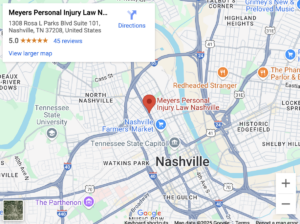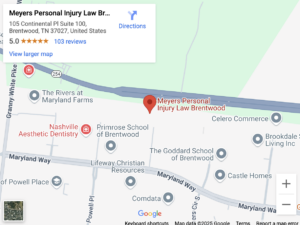Chad Meyers | August 29, 2024 | Car Accidents

Driving in Tennessee can be stressful enough without the added worry of encountering an uninsured driver. This situation can quickly become complicated and intimidating. If you’re involved in an accident with an uninsured driver in Tennessee, you might be wondering what your options are.
Tennessee law requires that all drivers carry a minimum amount of car insurance, but unfortunately, not everyone complies. If the other driver lacks insurance, you will need to rely on your insurance policy, specifically your uninsured motorist coverage, to handle the expenses. Understanding these policies and their implications is crucial for making informed decisions.
The key here is preparation and awareness. By knowing your coverage and rights, you can effectively navigate the aftermath of an accident involving an uninsured motorist. Familiarizing yourself with Tennessee’s specific requirements and protections can make all the difference in these challenging situations. Contact Meyers Personal Injury Law for more information about Brentwood car accidents and car insurance.
Understanding Tennessee’s Auto Insurance Requirements
Tennessee law mandates certain auto insurance coverage to legally drive. Violations can result in penalties, including fines and driver’s license suspension.
Mandatory Insurance Coverage
Drivers in Tennessee must have liability insurance. This includes:
- Bodily Injury Liability: Minimum $25,000 per person, $50,000 per accident.
- Property Damage Liability: Minimum $15,000 per accident.
Optional coverages include collision, comprehensive, and uninsured motorist insurance. Although optional, these coverages can offer additional financial protection. Insurance companies often provide various packages that can be customized to fit individual needs, providing broader security beyond state minimums.
Penalties for Uninsured Motorists
Driving without insurance in Tennessee has serious consequences. First-time offenders may face fines up to $300. In addition to fines, the state may suspend the uninsured driver’s license.
Vehicles may also be impounded if proof of insurance is not provided. Reinstating a suspended license involves paying fines and providing proof of insurance, which adds time and financial burden. Repeat offenders face stiffer penalties, including higher fines and longer suspension periods.
Options for Insured Drivers in an Accident with an Uninsured Motorist
Engaging in a car accident with an uninsured driver in Tennessee can be challenging. Insured drivers have specific options to cover costs and protect themselves.
Filing a Claim Through Uninsured Motorist (UM) Coverage
Uninsured Motorist (UM) coverage is designed to protect insured drivers when the at-fault party lacks insurance. In Tennessee, UM coverage is mandatory unless the policyholder rejects it in writing.
If a driver has UM coverage, they can file a claim with their insurance provider. This coverage can reimburse them for medical bills, vehicle repairs, and other related expenses. The process involves contacting the insurance company, providing accident details, and submitting necessary documentation like police reports and medical bills.
Taking Legal Action Against the Uninsured Driver
If the driver does not have Uninsured Motorist coverage, another option is taking legal action against the uninsured driver. This involves filing a lawsuit to recover damages incurred from the accident.
Legal action may cover medical expenses, vehicle repairs, and lost wages. However, it requires proving the other driver’s fault and substantiating the costs incurred through evidence and documentation. Consulting with car accident attorney from Meyers Personal Injury Law who is experienced in such cases can provide further guidance and increase the chances of a successful claim.
Steps to Take After an Accident with an Uninsured Driver
Stay Calm and Safe: Ensure everyone is safe and move to a secure location if possible. Avoid confrontations and keep a cool head.
Call the Police: Reporting the accident to the police is crucial. An official report will be essential for insurance claims and legal matters.
Collect Information: Gather names, contact information, and vehicle details from the other driver. Document the accident scene with photos and take notes on what occurred.
Seek Medical Attention: Even minor injuries should be checked by a healthcare professional in case they mask more severe injuries. Medical records will support any future claims.
Notify Your Insurance Company: Inform your insurer about the accident as soon as possible. Provide all gathered information and the police report.
Consider Legal Advice: Consulting a lawyer from Meyers Personal Injury Law may be beneficial. They can guide you through potential legal challenges and help secure average 18-Wheeler Accident Settlements in Tennessee .
The Importance of Uninsured Motorist Coverage
Given the risks associated with uninsured drivers, having Uninsured Motorist (UM) coverage is highly advisable. This coverage not only provides peace of mind but also ensures that you are not left financially vulnerable in the event of an accident with an uninsured driver. While it may increase your insurance premiums slightly, the benefits far outweigh the costs, especially in a state where not all drivers comply with mandatory insurance laws.
In conclusion, while encountering an uninsured driver in Tennessee adds complexity to an already stressful situation, being well-prepared and informed can help you navigate the aftermath more effectively. Understanding your insurance options, knowing the legal requirements, and taking appropriate steps after an accident are key to protecting yourself and securing the necessary compensation.
Contact Our Nashville Personal Injury Law Firm Today at Meyers Personal Injury Law
If you were injured in an accident in Nashville or Brentwood and need legal help, contact our Nashville personal injury lawyers at Meyers Personal Injury Law to schedule a free case review today.
Meyers Personal Injury Law Nashville
1308 Rosa L Parks Blvd Suite 101,
Nashville, TN 37208
(615) 258-9000

Meyers Personal Injury Law Brentwood
105 Continental Pl Suite 100,
Brentwood, TN 37027
(615) 258-9000
About the Author Chad Meyers

Chadwick D.G. Meyers is the founding attorney of Meyers Personal Injury Law. He earned his J.D. from the Nashville School of Law and focuses his practice on serious personal injury cases involving car accidents, wrongful death, funeral home negligence, and more.
Chad is frequently consulted by attorneys nationwide on complex claims and has been recognized by The National Trial Lawyers and other legal organizations. Click here to view some of the successful case results Chad has achieved for his clients.



